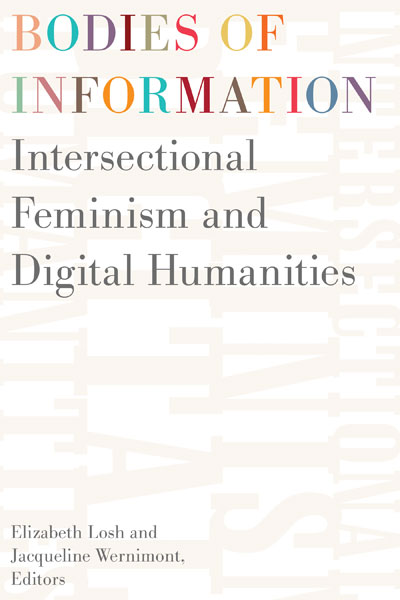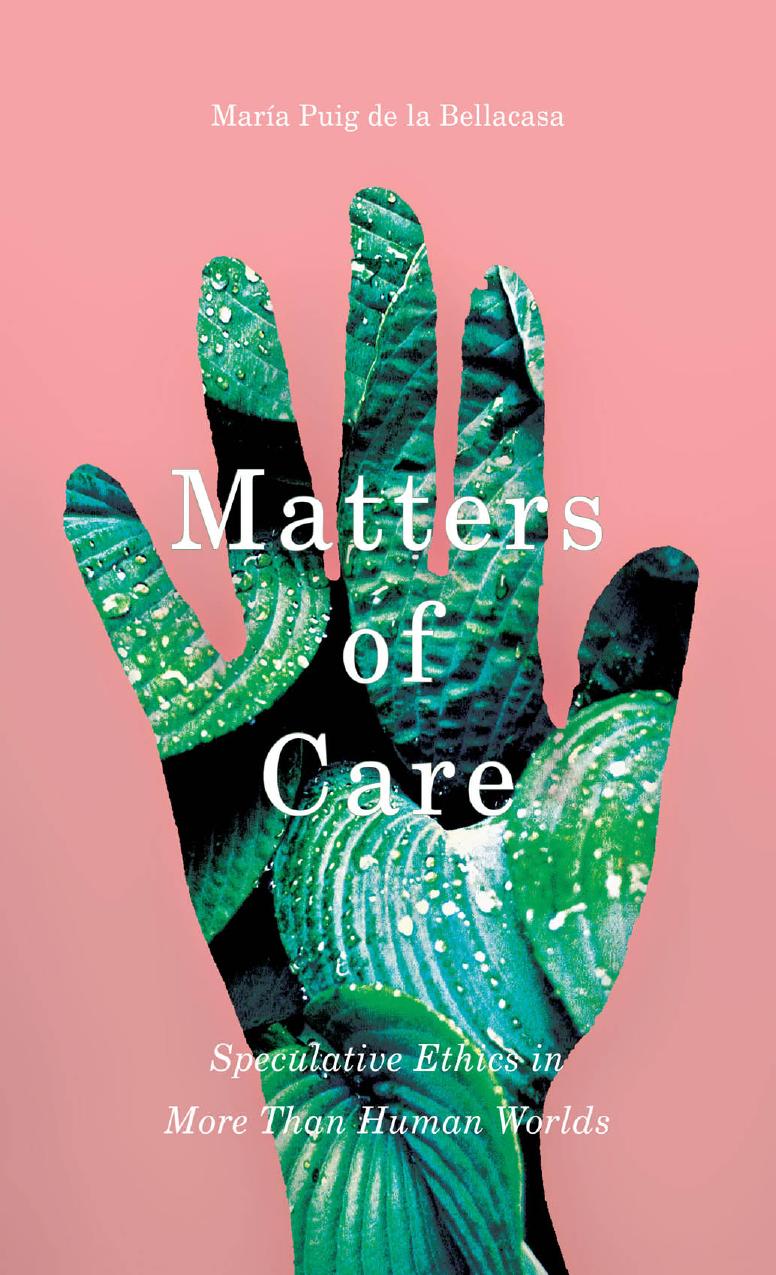Elizabeth Losh, Jacqueline Wernimont (eds.): Bodies of Information: Intersectional Feminism and Digital Humanities (2018)
Filed under book | Tags: · affect, body, digital humanities, feminism, intersectionality, labour, materiality, new materialism, ubiquitous computing

“In recent years, the digital humanities has been shaken by important debates about inclusivity and scope—but what change will these conversations ultimately bring about? Can the digital humanities complicate the basic assumptions of tech culture, or will this body of scholarship and practices simply reinforce preexisting biases? Bodies of Information addresses this question by assembling a varied group of voices, showcasing feminist contributions to a panoply of topics, including ubiquitous computing, game studies, new materialisms, and cultural phenomena like hashtag activism, hacktivism, and campaigns against online misogyny.”
Contributors: Babalola Titilola Aiyegbusi, Moya Bailey, Bridget Blodgett, Barbara Bordalejo, Jason Boyd, Christina Boyles, Susan Brown, Lisa Brundage, micha cárdenas, Marcia Chatelain, Danielle Cole, Beth Coleman, T. L. Cowan, Constance Crompton, Amy E. Earhart, Nickoal Eichmann-Kalwara, Julia Flanders, Sandra Gabriele, Brian Getnick, Karen Gregory, Alison Hedley, Kathryn Holland, James Howe, Jeana Jorgensen, Alexandra Juhasz, Dorothy Kim, Kimberly Knight, Lorraine Janzen Kooistra, Sharon M. Leon, Izetta Autumn Mobley, Padmini Ray Murray, Veronica Paredes, Roopika Risam, Bonnie Ruberg, Laila Shereen Sakr, Anastasia Salter, Michelle Schwartz, Emily Sherwood, Deb Verhoeven, Scott B. Weingart.
Publisher University of Minnesota Press, 2018
Debates in the Digital Humanities series, 4
Open Access
ISBN 9781517906108, 1517906105
xxv+491 pages
María Puig de la Bellacasa: Matters of Care: Speculative Ethics in More than Human Worlds (2017)
Filed under book | Tags: · agency, biopolitics, care, ecology, ethics, feminism, knowledge, naturecultures, object, politics, soil, technoscience, touch

“To care can feel good, or it can feel bad. It can do good, it can oppress. But what is care? A moral obligation? A burden? A joy? Is it only human? In Matters of Care, María Puig de la Bellacasa presents a powerful challenge to conventional notions of care, exploring its significance as an ethical and political obligation for thinking in the more than human worlds of technoscience and naturecultures.
Matters of Care contests the view that care is something only humans do, and argues for extending to non-humans the consideration of agencies and communities that make the living web of care by considering how care circulates in the natural world. The first of the book’s two parts, “Knowledge Politics,” defines the motivations for expanding the ethico-political meanings of care, focusing on discussions in science and technology that engage with sociotechnical assemblages and objects as lively, politically charged “things.” The second part, “Speculative Ethics in Antiecological Times,” considers everyday ecologies of sustaining and perpetuating life for their potential to transform our entrenched relations to natural worlds as “resources.”
From the ethics and politics of care to experiential research on care to feminist science and technology studies, Matters of Care is a singular contribution to an emerging interdisciplinary debate that expands agency beyond the human to ask how our understandings of care must shift if we broaden the world.”
Publisher University of Minnesota Press, Minneapolis, 2017
Posthumanities series, 41
ISBN 9781517900656, 1517900654
265 pages
Reviews: Miriam Ticktin & Katinka Wijsman (Hypatia, 2017), Sonja Jerak-Zuiderent (Science & Technology Studies, 2017), James McMaster (Women & Performance, 2017), Kelly Dombroski (Journal of Cultural Economy, 2018), Stephen Healy (Journal of Cultural Economy, 2018), Elizabeth Reddy (Journal of Cultural Economy, 2018), Gerda Roelvink (Journal of Cultural Economy, 2018), Maria Puig de la Bellacasa (response, Journal of Cultural Economy, 2018), Katie Ulrich (Cultures of Energy, 2018), Garrett Bunyak (Configurations, 2018), Sarah Weiger (ISLE, 2019), Farhan Samanani (Society+Space, 2019), Richard Brons (Ethics of Care, 2019).
Commentary: Michelle Murphy (Social Studies of Science, 2015).
Interview with author (Cultures of Energy, 2018, 70 min)
Comment (0)Leslie Kanes Weisman: Discrimination by Design: A Feminist Critique of the Man-Made Environment (1992)
Filed under book | Tags: · architecture, city, feminism, home, public space, universal design, urban planning, women

“Discrimination by Design is a fascinating account of the complex social processes and power struggles involved in building and controlling space. Leslie Kanes Weisman offers a new framework for understanding the spatial dimensions of gender and race as well as class. She traces the social and architectural histories of the skyscraper, maternity hospital, department store, shopping mall, nuclear family dream house, and public housing high rise. Her vivid prose is based on exhaustive research and documents how each setting, along with public parks and streets, embodies and transmits the privileges and penalties of social caste.
In presenting feminist themes from a spatial perspective, Weisman raises many new and important questions. When do women feel unsafe in cities, and why? Why do so many homeless people prefer to sleep on the streets rather than in city-run shelters? Why does the current housing crisis pose a greater threat to women than to men? How would dwellings, communities, and public buildings look if they were designed to foster relationships of equality and environmental wholeness? And how can we begin to imagine such a radically different landscape?
In exploring the answers, the author introduces us to the people, policies, architectural innovations, and ideologies working today to shape a future in which all people matter. Richly illustrated with photographs and drawings, Discrimination by Design is an invaluable and pioneering contribution to our understanding of the issues of our time–health care for the elderly and people with AIDS, homelessness, racial justice, changing conditions of work and family life, affordable housing, militarism, energy conservation, and thepreservation of the environment. This thoroughly readable book provides practical guidance to policymakers, architects, planners, and housing activists. It should be read by all who are interested in understanding how the built environment shapes the experiences of their daily lives and the cultural assumptions in which they are immersed.” (from the back cover)
Publisher University of Illinois Press, Urbana, 1992
ISBN 0252063996, 9780252063992
x+190 pages
Reviews: Gail Lee Dubrow (Journal of Planning Education and Research, 1993), Esther da Costa Meyer (NWSA Journal, 1993), Diane Favro (Journal of American History, 1994), Joanne K. Guilfoil (Journal of Social Theory in Art Education, 1994), Irene Nierhaus (L’Homme, 1994, DE), Nancy M. Somerick (Public Relations Review, 1995).
Commentary: Spatial Agency (n.d.).

